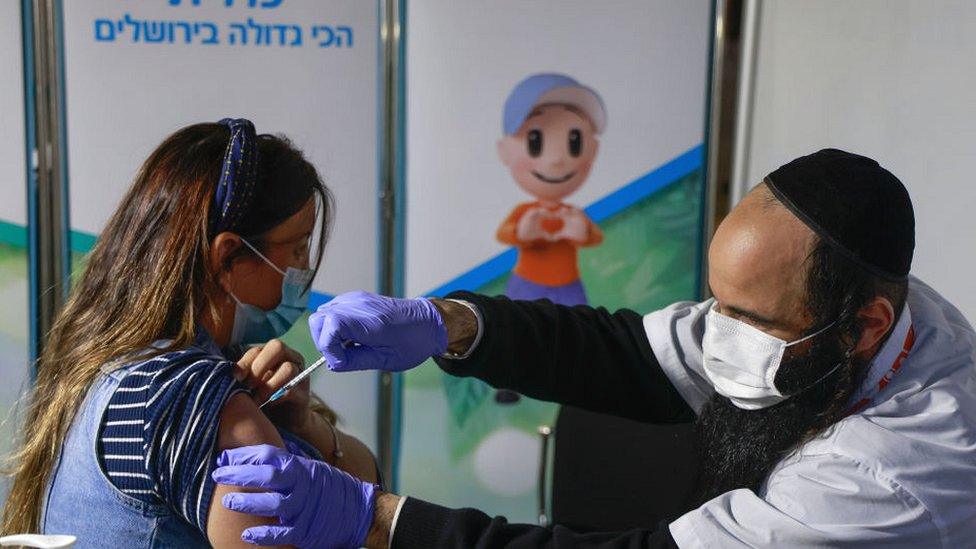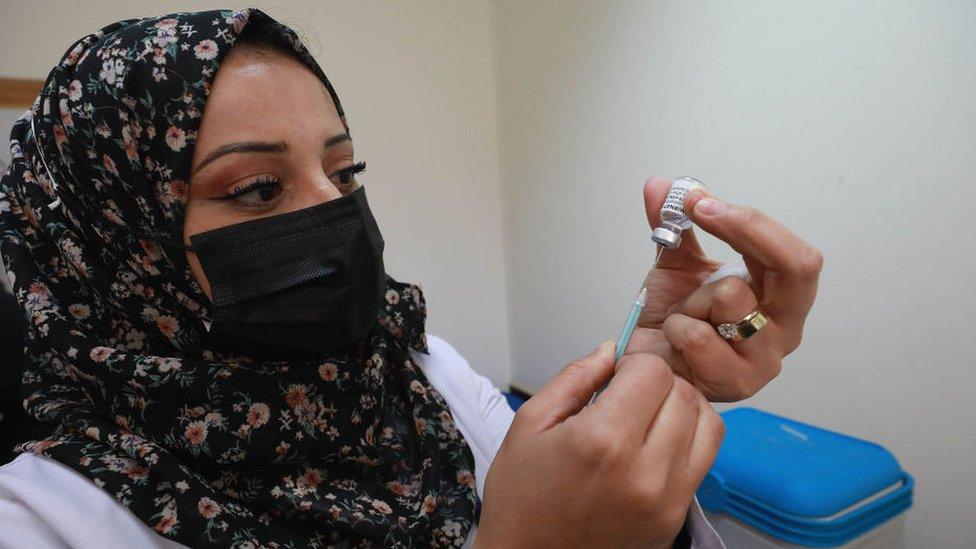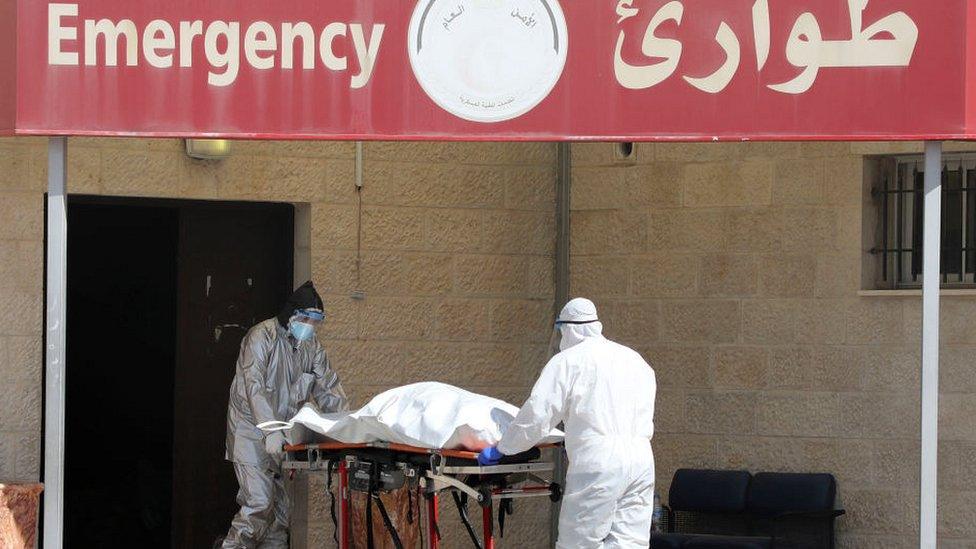Covid-19: Palestinians lag behind in vaccine efforts as infections rise
- Published
Covid-19: Vaccine divides in the Middle East
The Palestinian authorities have begun administering vaccines supplied under the international Covax vaccine-sharing scheme, as infections continue to rise sharply in the West Bank and Gaza.
While Israel has surged ahead with its vaccination programme, the Palestinian territories are way behind.
Who is Israel vaccinating?
Israel began its vaccination campaign last December and is the leading nation globally for the number of doses per head of population.

Israel started rolling out its vaccination programme in December
Israel eased lockdown restrictions in February as studies showed the effectiveness of its vaccination campaign in preventing hospitalisations and deaths.
In occupied East Jerusalem, all Palestinians are entitled to be vaccinated by Israel, as are medics working at the six Palestinian hospitals there - many of whom come from other parts of the West Bank and Gaza.
Palestinians in East Jerusalem have Israeli residency status - so those living there pay Israeli taxes and have access to Israeli health insurance.
Israel did not initially offer the vaccine to other Palestinians until early March, when it decided to start vaccinating all Palestinians who come to work in Israel or in Israeli settlements in the West Bank.
There are around 133,000 such workers, according to the Palestinian Central Bureau of Statistics, with many crossing over to Israel from the West Bank on a daily basis.
What's happening in the Palestinian areas?
It's a different picture in the West Bank and Gaza - home to an estimated five million people and regarded as occupied territories by the international community.
Here the vaccination programme has only just got going.
Since early February there has been a sharp rise in both infections and deaths, leading the authorities to impose a lockdown in the West Bank.

Vaccines supplied by the Covax scheme have arrived in the Palestinian territories
World Health Organization (WHO) data shows that there have so far been more than 251,600 confirmed coronavirus cases and more than than 2,670 deaths among Palestinians in the West Bank, Gaza and East Jerusalem, external.
The first consignment of vaccines provided by the Covax scheme to help poorer countries access supplies has now arrived in the West Bank and Gaza.
37,440 doses of Pfizer-BioNTech vaccine and 24,000 doses of AstraZeneca vaccine have been delivered, according to a statement from Unicef., external
The international Covax scheme, backed by the WHO, should cover up to 20% of vaccine requirements for the Palestinians.
The Palestinians have sourced some limited quantities of vaccines from elsewhere.
A delivery of 10,000 doses of Russian-made vaccine has arrived, 2,000 of which have been sent on to Gaza. Gaza has also received 20,000 Russian vaccine doses donated by the UAE.
Getting vaccines to Gaza is faced with the logistical challenges of the restrictions imposed on the area, which has been under blockade by Israel and Egypt since the militant Islamist movement Hamas took charge there in 2007.
A recent report by the World Bank says that the Palestinians will need more financial and logistical help in order to cover 60% of the population.
It has urged Israel to consider donating extra doses it has ordered but does not need to the Palestinians., external
Israel says it is giving 5,000 doses to the Palestinians, two thousand of which have been delivered to the West Bank so far.
Whose responsibility is it to vaccinate Palestinians?
The United Nations (UN) human rights body has released a statement, external saying it's Israel's responsibility to provide equitable access to Covid-19 vaccines for Palestinians in Gaza and the West Bank.
The body says differential access is "morally and legally" unacceptable under international law laid out in the Geneva Conventions on the regulation of occupied territories.

But Israeli health minister, Yuli Edelstein, told the BBC: "We can also look into the so-called Oslo agreements where it says loud and clear that the Palestinians have to take care of their own health."
The Oslo accords - which Israel signed with the Palestine Liberation Organisation - give the Palestinian Authority oversight of public health under the principles of self-determination.
But the Palestinian authorities point to another part of those accords which says: "Israel and the Palestinian side shall exchange information regarding epidemics and contagious diseases, shall co-operate in combating them and shall develop methods for [the] exchange of medical files and documents."
The Oslo accords, agreed in 1993 and 1995, set out how parts of the West Bank and Gaza would be governed under an interim framework until a permanent peace settlement can be reached.
But UN experts say international law takes priority over these accords.
They say - despite Israel's position on the issue - the Fourth Geneva Convention is specific about the duty of the occupying power to provide healthcare.
